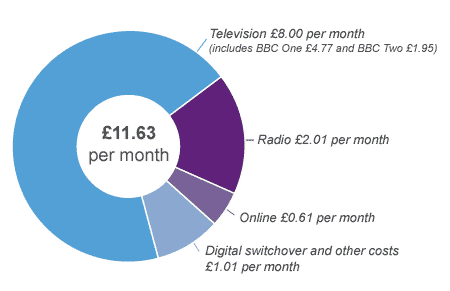
The License Fee pays for the BBC's television, radio, and online operations, but now the British government wants a portion of it to be directed towards broadband as well.
Britain’s new coalition government announced Wednesday it was scrapping a proposed £6 a year phone tax to help expand rural broadband in the country.
“We need investment in our digital infrastructure,” said George Osborne, the Chancellor of the Exchequer. “But the previous government’s landline duty is an archaic way of achieving this, hitting 30 million households who happen to have a fixed telephone line. I am happy to be able to abolish this new duty before it is even introduced.”
“Instead, we will support private broadband investment, including to rural areas, in part with funding from the digital switchover under-spend within the TV licence fee.”
Osborne is referring to the average £11.63 monthly fee British citizens pay to help fund the operations of the BBC’s radio, television and online operations. A surplus of up to up to £300 million is anticipated to remain after the UK completes its transition to digital television in the next two years. That money would be diverted to expanding rural broadband under the government plan.
But campaigners for better rural broadband service complain that will not raise nearly enough to provide broadband across the countryside. The 50p monthly telephone tax proposed by the former Labour government would have raised nearly £1 billion per year.
Charles Trotman, of the Country Land and Business Association, told The Telegraph it will not be enough money to connect all rural areas. He said remote communities risk being left behind in ‘broadband deserts’ unless more is done to help villages set up connections themselves.
Other critics contend the surplus from the digital TV transition may not exist two years from now. Thus far, mostly rural regions in England have made the transition to digital, costing the government publicity campaign less than expected.
Rather than the tax, Osborne claims the government can spur investment from the private sector by “making regulatory changes to reduce the cost of roll-out.” He did not specify what those changes might be.
The government claims it is committed to providing up to 2Mbps broadband service across the entire country, but the lack of action in many areas have forced small towns and villages to launch their own municipal broadband services, sometimes funded by residents themselves.
[flv width=”512″ height=”308″]http://www.phillipdampier.com/video/BBC Municipal Broadband 4-2010.flv[/flv]
The BBC covers two British communities doing it themselves — providing enhanced broadband because private providers wouldn’t. One in Highworth offers free Wi-Fi for up to two hours daily, while in Lyddington residents raised £37,000 to obtain enhanced DSL service. (5 minutes)
[flv width=”480″ height=”292″]http://www.phillipdampier.com/video/Signal – Connectivity on the move 6-10.mp4[/flv]
Highworth (Swindon) relies on Signal, a high speed WISP/Wi-Fi network that offers up to 20/2 Mbps unlimited access with no Internet Overcharging schemes like usage caps or overage fees for £5.99 per month, or up to two hours daily access for free. (4 minutes)


 Subscribe
Subscribe


